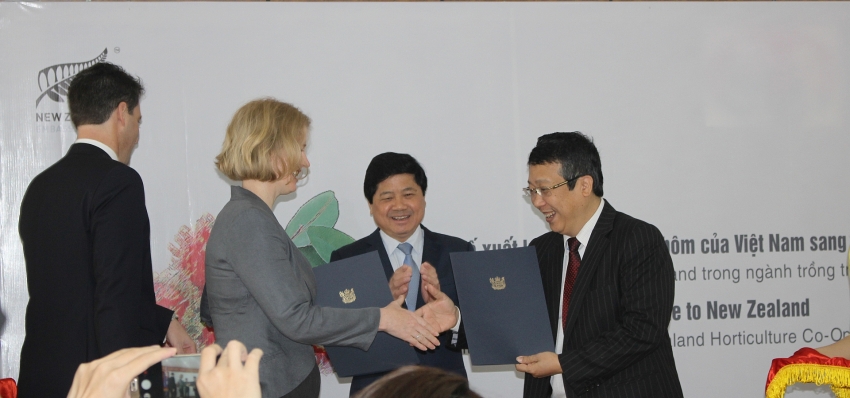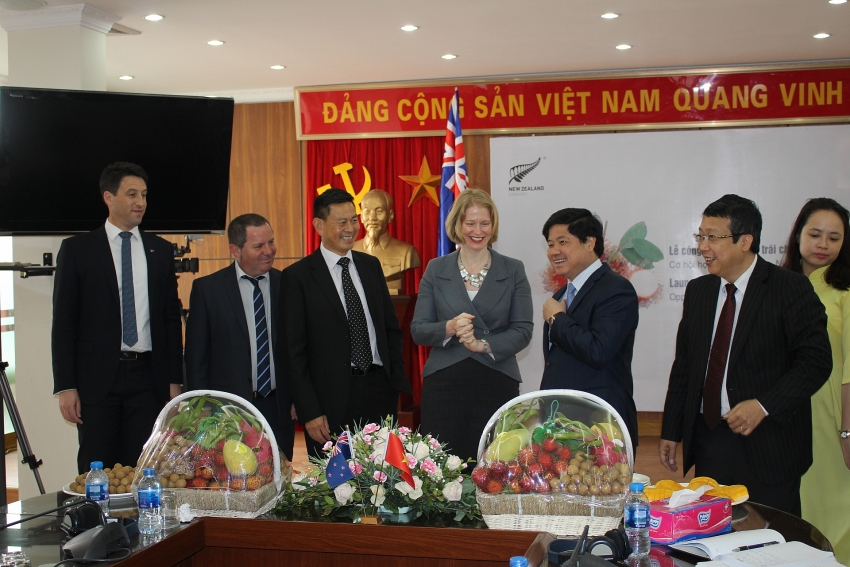New Zealand gives go-ahead to fresh Vietnamese rambutan
Ambassador of New Zealand to Vietnam Wendy Matthews today officially announced that New Zealand has authorised the import of rambutan from Vietnam, making the country the first to get a licence for the fruit.
Ambassador Matthews has also handed over the signed Import Health Standard Export Plan for Rambutan to the Ministry of Agriculture and Rural Development (MARD).
 |
| The New Zealand Ambassador presenting the Standard Export Plan to Hoang Trung, director general of the Plant Protection Department under MARD |
According to the ambassador, so far three Vietnamese tropical fruits have been granted market access to New Zealand, including rambutan in 2018, dragon fruit in 2014, and mango in 2011.
“As Vietnamese rambutan has now gained access to New Zealand, it is not only the opportunity [to export] that we have secured here, but, more meaningfully, this shows that the competitive advantages of local fresh produce have been strengthened over time,” said MARD Deputy Minister Le Quoc Doanh on the sidelines of the seminar discussing the support the local government gives to enhance the productivity of the agricultural sector, held by the New Zealand Embassy and MARD.
“This is a testament to how the quality of Vietnamese fruit has improved over the years, as we all know that the New Zealand market is a tough one with high standards and requirements for imported fresh produce, including strict phytosanitary and food safety criteria,” noted Doanh. “If we can make it to New Zealand with our fresh produce, we can make it to anywhere else around the world.”
Ambassador Matthews said, “New Zealand is one of the most efficient agricultural economies in the world, with a reputation for producing cutting edge research and technology, robust and safe agricultural practices, and delicious and high-quality products.”
“During his official visit to New Zealand in March this year, Prime Minister Nguyen Xuan Phuc agreed with New Zealand Prime Minister Jacinda Ardern to encourage further growth in two-way trade, including high-tech agriculture. There are many opportunities for our agricultural sectors to cooperate to help support the development of Vietnam’s growing agricultural sector and value chains.”
 |
| Vietnam will be the first nation to export fresh rambutan to New Zealand |
In 2017, Vietnam exported a record high of $3.5 billion worth of fresh fruit. In the first quarter of the year, the country reported $934 million in fresh fruit exported overseas, up 33 per cent compared to the same quarter in 2017.
New Zealand experts from Plant & Food Research and the New Zealand Government-to-Government Partnerships Office (G2G) also joined the ambassador to discuss how New Zealand’s technical expertise and innovation in the agricultural sector can help support the Vietnamese agricultural sector to be more internationally competitive.
New Zealand’s world class agriculture expertise is making a practical difference in Vietnam by improving farmer’s income and food safety. Agriculture is one of the four priorities for the New Zealand Aid Programme in Vietnam, along with education, disaster risk management, and renewable energy.
Key projects include the Premium Fruit Variety Development Project to improve the income of Vietnam’s dragon fruit farmers and develop new varieties for commercialisation, a safe vegetables project in Binh Dinh Province, and a new Food Safety Project to assist Vietnamese food processing companies and supplier farmers to achieve safe food certification, improving incomes and reducing food risks for consumers.
New Zealand also supports agriculture and food safety through its 30 post graduate scholarships offered each year, short-term training scholarships, and the English Language Training for Officials programme.
Two way trade in goods and services between New Zealand and Vietnam in 2017 totalled almost at $1.24 billion in 2017, representing a 32 per cent increase over 2016.
Bilateral goods trade has tripled since the signing of the ASEAN, Australia, and New Zealand Free Trade Agreement (AANZFTA) in 2009. There are significant opportunities to expand growth, particularly in agricultural cooperation, education, and tourism.
What the stars mean:
★ Poor ★ ★ Promising ★★★ Good ★★★★ Very good ★★★★★ Exceptional
 Tag:
Tag:
Related Contents
Latest News
More News
- Foreign leaders extend congratulations to Party General Secretary To Lam (January 25, 2026 | 10:01)
- Russian President congratulates Vietnamese Party leader during phone talks (January 25, 2026 | 09:58)
- Worldwide congratulations underscore confidence in Vietnam’s 14th Party Congress (January 23, 2026 | 09:02)
- Political parties, organisations, int’l friends send congratulations to 14th National Party Congress (January 22, 2026 | 09:33)
- 14th National Party Congress: Japanese media highlight Vietnam’s growth targets (January 21, 2026 | 09:46)
- 14th National Party Congress: Driving force for Vietnam to continue renewal, innovation, breakthroughs (January 21, 2026 | 09:42)
- Vietnam remains spiritual support for progressive forces: Colombian party leader (January 21, 2026 | 08:00)
- Int'l media provides large coverage of 14th National Party Congress's first working day (January 20, 2026 | 09:09)
- Vietnamese firms win top honours at ASEAN Digital Awards (January 16, 2026 | 16:45)
- ASEAN Digital Ministers' Meeting opens in Hanoi (January 15, 2026 | 15:33)






















 Mobile Version
Mobile Version